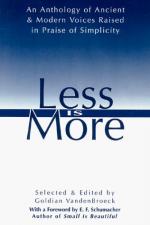
|
| Name: _________________________ | Period: ___________________ |
This test consists of 15 multiple choice questions and 5 short answer questions.
Multiple Choice Questions
1. Michael Harrington points out that there is virtue in choosing _________ over the desolation of empty abundance.
(a) Knowledge.
(b) Poverty.
(c) Truth.
(d) Peace.
2. Schumacher believes that modern ___________ is destroying the planet, according to the book.
(a) Media.
(b) Technology.
(c) Living.
(d) Retirement funding.
3. ____________ writes that a few people know when they have enough and even fewer know how to use it.
(a) William Penn.
(b) Joseph Campbell.
(c) William James.
(d) Ivan Illich.
4. Ivan Illich believes that the world is divided into _______ camps of thought about money and about materialism.
(a) Five.
(b) Three.
(c) Four.
(d) Two.
5. Francis contemplates ___________ to a noble and wealthy woman, but reality strikes him later of this choice.
(a) Giving a child.
(b) Marriage.
(c) Commitment.
(d) Giving what he owns.
6. When a man is able to discard __________, according to the book, he will be able to discover his own sense of contentment.
(a) Power.
(b) Avarice.
(c) Status.
(d) Truth.
7. ________ says that the only purpose of having money is to use it. There can be no other reason, according to the book.
(a) William Milton.
(b) Ben Franklin.
(c) William James.
(d) Dorothy Day.
8. When the family is __________ in society and not connected to others, then it can be truly happy, according to the book.
(a) Independent.
(b) Enmeshed.
(c) Communal.
(d) Convivial.
9. The poor man is made ________ by the rich man's gift, though the rich man is ashamed of the thing that he has given.
(a) Joyful.
(b) Beautiful.
(c) Truthful.
(d) Honorable.
10. St. ________ dubs the life of the person who does not hold onto wealth as that of Lady Poverty.
(a) Peter.
(b) Thomas.
(c) Francis.
(d) John.
11. The wise and _______ man has always made it a goal to be unencumbered by things or wealth, according to the book.
(a) Honest.
(b) Spiritual.
(c) Rich.
(d) Peaceful.
12. The success of the super rich is that they create rules and values that then become the benchmark for living the ____________.
(a) Rich way.
(b) Good life.
(c) Rich life.
(d) True happiness.
13. _________ in one's life is really what makes one rich, according to the book and according to one of the sections.
(a) Power.
(b) Contentment.
(c) Truth.
(d) Money.
14. What is the job of St. Francis of Assisi's father when he is growing up in the world?
(a) Doctor.
(b) Bookkeeper.
(c) Merchant.
(d) Priest.
15. Barnfield goes on to use ________ to show the ridiculous nature of man when he wants money in his life.
(a) Satire.
(b) Puns.
(c) Images.
(d) Rhymes.
Short Answer Questions
1. Jean _________ speaks of the happiness of the family in his writings, according to the book in the beginning of this section.
2. _________ is something that lies within each man, and in the traditional wisdom of mankind, according to the book.
3. The ________ can subsist within itself, providing enough food and clothing for the members within, according to the book.
4. The desire to gain ________ and the fear of its loss creates ideal conditions for corruption and for cowardice.
5. Solutions to the health problems of wealth can be found in the restoration of ________, according to the book.
|
This section contains 477 words (approx. 2 pages at 300 words per page) |

|




